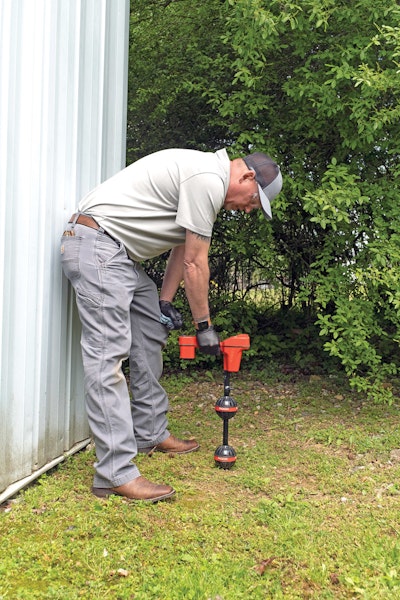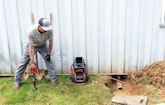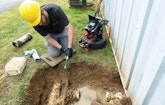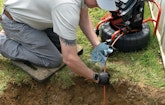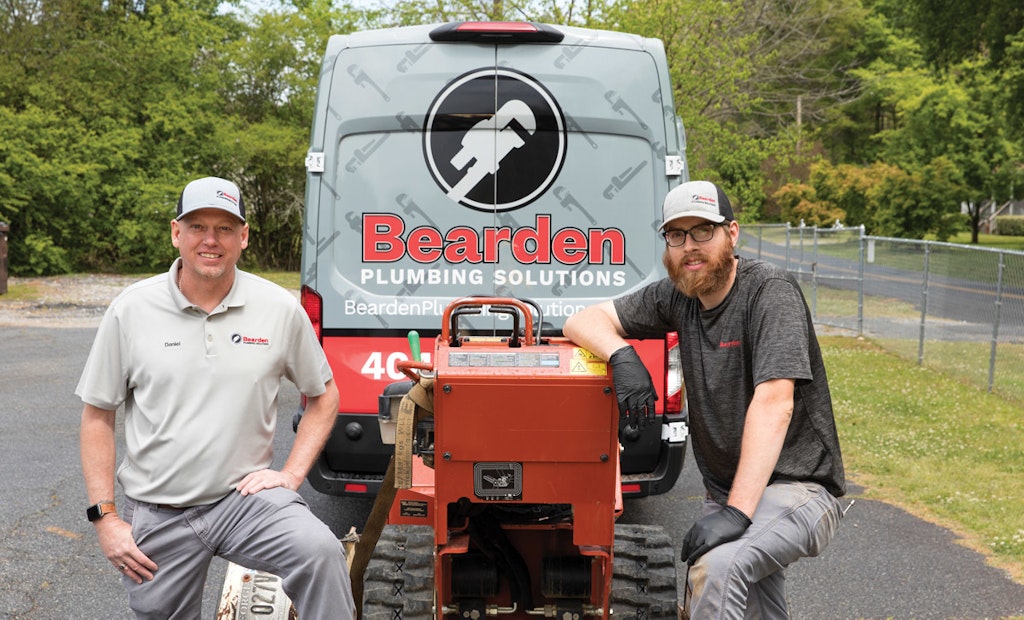
Owner Daniel Bearden (left) and plumber Cody Letner are a two-man team providing full plumbing and drain services including sewer and drain installation, cleaning and repair, and backflow testing.
Interested in Cleaning?
Get Cleaning articles, news and videos right in your inbox! Sign up now.
Cleaning + Get AlertsWhen you’re getting a new business off the ground, you often have to take on any job that comes your way. When Daniel Bearden struck out on his own to open Bearden Plumbing Solutions, he took an “all-inclusive” approach to finding work.
“Right from the beginning, I did drains and sewer lines, faucets, water heaters, an occasional waterline — and I still do.” His company’s original service area was “wherever I could get a call. When you are a small and new company, you take it all.”
Before starting his own business, Bearden spent 20 years working and learning the plumbing trade in Atlanta, working under two mentors he credits with giving him a foundation from which to launch his company.
One was a master plumber and utility contractor, Tommy Dillard. Dillard first introduced Bearden to essential pipeline work for new construction, commercial and industrial customers. “I felt like I was just a shovel and a jackhammer for a while,” Bearden recalls of his stint working on sewer mains and storm drains. But Dillard became a teacher of the craft. “He took me under his wing and let me go with him on weekends to do plumbing for family and friends.”
In 2001, Bearden went a different direction. He had previously bumped into Bruce Brewer, the manager of Fulton Plumbing, Heating & Air Conditioning, a long-established company serving the Atlanta metro area. Brewer had given Bearden a business card and Bearden decided it was time to call the number.
“He became mentor number two,” Bearden says. “I gave him a call and it was fantastic. I was a younger guy, and he took me in, showed me the ropes and had me get a journeyman license. That’s when I began to realize you could make money in Georgia doing plumbing work.”
For most of the next 15 years, Bearden honed his skills plumbing both modest and higher-end homes and learning “how to be a service guy.” Then, having earned a master plumber’s license, he packed up and moved back to Adairsville in Bartow County, where he was born and raised. He was starting over, but as his own boss.
“I had a dream and a pickup truck, and I was upside down on the truck.” Six years later, Bearden Plumbing is becoming a big part of the local community.
Answering every call
Though he’s now established Bearden says he still takes work as it comes. “I preach to my guy we have to be ready for all challenges. Whatever the call, we try to take our time with each client and look at the big picture rather than just focus on, say, a leaking toilet. We want to make sure the problem we’re addressing is not just a symptom.”
Drain cleaning calls also run the gamut. New PVC lines are frequently installed in older areas to replace various dimensions of clay and concrete pipes. “Most sewers here are 4-inch, but this week we worked on a 6-inch drain at a plant and a 1 1/2-inch line in a home. We run into all of it but usually we’re installing 4-inch lines.”
The plumbing team also encounters plenty of copper pipe in older homes. The traditional metal water pipes always will be in the mix of piping to be repaired or installed, Bearden says. “PEX is right up there with it though. I was brought up doing copper. That’s all I did for years. Soldering is an art form.”
Soldering is giving way to ProPress now. Introduced some 30 years ago, the clamping method requires no flame and is a much quicker joining mechanism. Though Bearden welcomes new tools and procedures, he says he likes to “stand back and watch them for a while” to satisfy himself they are good for his customers. He is convinced ProPress is such a product.
“You have to be fluid in your learning. There always are new materials and technology coming out and if you are not on the cusp of that you are going to be left behind. That’s not a position we want to work from.”
On the other hand, he knows a good thing when he sees it. In water heaters, for example, he usually recommends a Rheem unit. “Every plumber has his own take. I think about the products I’ve had the least problems with, and Rheem is one of those I really have had the least callbacks on.” The company installs 100-150 water heaters a year.
Most service calls are to residential properties, a customer base that keeps growing as more and more people choose to live in outlying metro counties and commute into Atlanta. Developers are rapidly building subdivisions to house the newcomers, all of whom will need plumbing and drain services.
“There are a lot of new subdivisions. Anywhere there is dirt, someone is putting in a subdivision,” Bearden says. “We’ve had a lot of people move in since I’ve been back. They leave the hustle and bustle of the Atlanta metro area to find a small-town feel. We are that small town, and we want to be their plumber.”
But the company is growing its commercial side, too, already doing all the work for local Chick-fil-A and Hampton Inn franchises and several manufacturing facilities.
While Bearden’s plumbing knowledge serves him well in the rural communities he serves, he’s had to make some adjustments since his time in Atlanta. Sewer lines, for instance, a mainstay of Bearden’s service work in the city, are a smaller component now: Most of his customers’ homes are on septic tanks. And while Atlanta home-heating systems were fueled by natural gas, the natural gas or propane is more common in Bartow County.
“That has been the biggest change,” Bearden says of the differences between urban and rural systems. “Our service calls have had to morph into something a little different.” Ultimately, though, the differences hold promise of giving the company extra work. “I have a good relationship with septic tank companies, but I’m going to start working on septic tank certification. It’s the obvious next step.”
Two-man team
Rather than advertise for an experienced plumber to join the company and share the workload, Bearden took the view that “if there were a plumber out there worth his salt, he already had a job. I decided I would just build one.”
So, he did. Three years ago, he became the mentor to Cody Letner, who is finishing up his final year of apprenticeship at Bearden Plumbing. “I didn’t expect to enjoy watching him learn, but he’s excited about the trade and it’s a joy watching him come into his own,” Bearden says.
Letner will study for his journeyman license and then take on a bigger share of responsibility at the company. Bearden is cross-training Letner in all the services the company provides. “That’s how I was trained and I’m emulating the training I went through,” Bearden says. “I want the company service to be consistent.”
Expanding the toolbox
As a two-man operation, Bearden Plumbing Solutions has held off investing in equipment used only periodically. Bearden rents a mini-excavator as needed for water and sewer line replacement work. When a trenchless solution is called for, the company subs out the work to an Atlanta-based company.
“In our area, we mostly trench,” Bearden says. “We have run into some situations where it makes more sense to use trenchless relining. In Atlanta, we used trenchless quite often, but you have to keep in mind the demographics here. Plus, there is less landscaping to worry about disturbing.”
But he already is planning for expansion of his services, probably including trenchless pipe work. “We’ll be doing septic work at some point. I’m already a certified backflow tester. I’m not yet doing a lot of that, but it’s another tool in my toolbox. It will be an easy transition into other services.”
Bearden has relied on an older model RIDGID camera for his pipe inspection work, but that changed last year when he bought a new compact RIDGID SeeSnake C40 that he can run off his iPad. He’s enthusiastic about the difference that inspection work makes to plumbing and drain cleaning.
“We offer camera work with every drain call because we want to make sure we have the problem fixed and the customer sees the value of what we have done,” he says. “That camera is a game-changer. When I first started, I remember being taught how to look at the street for cracks in the asphalt to determine where a leak problem was. It was guesswork.”
He has a General Pipe Cleaners JM-1450 electric jetter for interior drain cleaning, which his customers frequently request. One in five of service calls request a jetting of the lines. “We want to provide the best solution that fits a customer’s budget.”
He has hauled his equipment from site to site in a 14-foot enclosed trailer, but recently purchased a new Ford Transit van. When Letner becomes fully licensed, the Transit will become the apprentice’s service truck and Bearden will return to driving his pickup. “The Transit is nice, but it doesn’t have the carrying capacity of that trailer. So, we have to be a little more mindful of what tools we have on it.”
Bearden Plumbing Solutions is growing steadily, but at a desired “snail’s pace” because “slow growth has been good to us,” Bearden says. “I am not going to let just anyone jump in my truck and represent me. We are going to continue this way. We could grow faster and send out three or four trucks on service calls, but if employees don’t fit our ethical, moral and professional standards, that will hurt us in the long run. This works for me.”
The community of plumbers in the rural area served by Bearden Plumbing is another welcome change from Atlanta, where “dog eat dog” is the prevailing attitude, according to Bearden. “We help out each other when we need to. There’s enough work in the area. If I can help them and they can help us, it’s a win for us and the community.
“My biggest competitor is myself. If I focus on what I am doing and set the goals high for myself and my employee, we’re doing what we’re supposed to be doing.”
